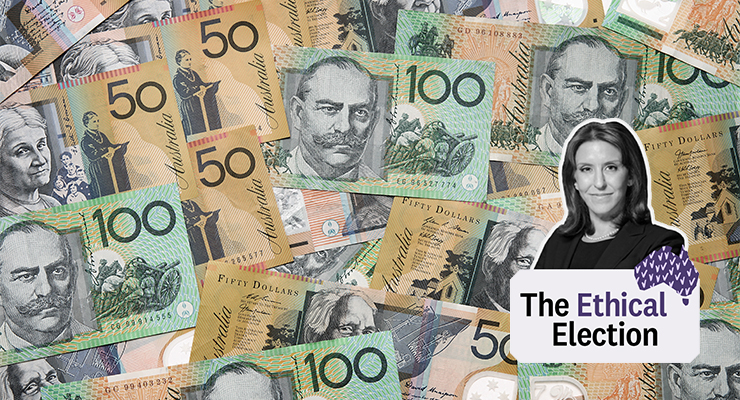
There are turning points in any election campaign. One is the point at which one contender steps over the line of one’s values into the abyss of no return. That point came last week when, in response to Anthony Albanese’s backing of a 5.1% hike in the minimum wage, Prime Minister Scott Morrison:
- told Sydney radio 2GB: “He can’t do that. He has just been pulling people’s legs.”
- dubbed Mr Albanese “reckless and dangerous” for making such a proposal, as well as a “loose unit” on the economy. “It’s like throwing fuel on the fire of rising interest rates and rising cost of living.”
- implied that Australians would just have to wear the hit to their budgets for the next 18 months because the only thing governments could do to increase wages was maintain a “strong economy”, saying, “The way wages rise is unemployment goes down.”
None of this is true, and it’s heartless besides.
Let’s start with the falsehoods, the first being that beyond sound economic management, there is nothing governments can do to support wages. In fact, there’s plenty the federal government can do to intervene in helpful ways.
This includes supporting a lift in the minimum wage at the Fair Work Commission, which will decide next month on whether the quarter of Australians workers making $20.33 per hour or $772.60 per week deserve a hike.
National and state governments of both persuasions make such recommendations all the time, including Malcolm Turnbull arguing against an “excessive” pay rise in 2007. The fact that Morrison’s government hasn’t taken a stand at all, little less in favour of low-paid workers, seems more about avoiding a spotlight being shone on a lack of Christian compassion than any conviction that the Coalition’s prediction that wage growth is around the corner — made in every budget since 2014 — is true.
It’s not. And if 10 years of evidence doesn’t convince you, try this theory, which comes from Dr Jim Stanford, from the Australia Institute’s Centre for Future Work: “There’s no credibility for either the government or the Reserve Bank to say the unemployment rate has come down, therefore wages will take off.”
Why? Because close to a decade of suppressing the capacity of workers to organise, and cutting real wages for public servants, had disabled the capacity of the economy to respond to supply and demand signals in the labour market. And until the policy and institutional changes that are causing the problem are reversed, “stubbornly slow” wage growth will continue.
Dr Stanford also notes the blatant injustice of telling Australia’s lowest paid to wear the acceleration of non-discretionary costs like food and housing, while CEOs have been enjoying pay rises of more than 20% while Australian business is enjoying its 10th year of profits rising at almost double the rate of wages. In fact, in Australia’s recorded economic history, company profit margins have never been higher.
“If there’s anyone who should pay for the adjustments back to a lower rate of inflation,” says Stanford, “it should be companies, not workers being forced to accept a permanent reduction in their standard of living.” His colleague Alison Pennington makes the same point this way: “We have a lot of fat [in company profits] that can feed a wage increase.”
Albanese concurs. Which is why he instinctively supported — in a way Morrison sought to portray as a gaffe — a 5.1% lift to the minimum wage. The question is, why do Morrison’s impulses lead in the opposite direction? Presumably because those who rely on the national wage case to keep their heads above water financially don’t live in marginal seats or vote Liberal, and so fall outside his concern. Notwithstanding his obligation as prime minister of the nation to govern for all of us.








How many investment properties does Scott Morrison own? One of the five highest paid government leaders in the world enjoying a base salary of $550,000 per year. People like Scott Morrison are so far removed from the realities of so many Australians – both in real terms and ideologically. People like Scott Morrison aren’t interested in th best possible outcomes for ALL Australians. It beggars belief why so many support him and his political party.
Morrison says the government can’t increase wages, but then he says his government will create tens of thousands of jobs. I think he’s got those things a***-about.
Dear Dr Leslie,
If you enjoyed the work of prof. Bob Altemeyer, you’ll like this one as well. 1000 reasons not to vote for SM and the LNP. mdavis dot XYZ.
If we don’t get rid of the coalition government at this election there will be a revolution in the next 10 years.
The cause will be low wages, high prices, no hope of housing for the lowest paid in our society, nursing homes become death houses, hospitals collapsing, people not being able to afford the necessities of life; and climate change reaching a tipping point that will destroy the world we know.
The ALP have been largely complicit in creating the increasingly stark inequality in Australia. How many investment properties does Mr Albanese enjoy?